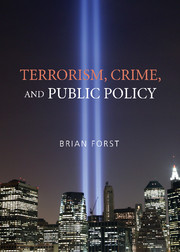Book contents
- Frontmatter
- Contents
- Credits
- Preface
- Acknowledgments
- 1 The Nature of Terrorism
- 2 Theories of Aggression and Terrorism
- 3 A Brief History of Terrorism
- 4 Two Trajectories of Humankind: Globalization or Clash?
- 5 Religion, the State, and Terrorism
- 6 Nonreligious Extremism and Terrorism
- 7 Technology and Terrorism
- 8 Terrorism throughout the World
- 9 Responses to Terrorism
- 10 Fear of Terrorism
- 11 Preventing Terrorism: Short-Term Approaches
- 12 Preventing Terrorism: Long-Term Strategies
- 13 Balancing Security and Rights to Liberty and Privacy
- 14 Toward a Safer and Saner Twenty-First Century
- Notes
- References
- Index
14 - Toward a Safer and Saner Twenty-First Century
Published online by Cambridge University Press: 05 June 2012
- Frontmatter
- Contents
- Credits
- Preface
- Acknowledgments
- 1 The Nature of Terrorism
- 2 Theories of Aggression and Terrorism
- 3 A Brief History of Terrorism
- 4 Two Trajectories of Humankind: Globalization or Clash?
- 5 Religion, the State, and Terrorism
- 6 Nonreligious Extremism and Terrorism
- 7 Technology and Terrorism
- 8 Terrorism throughout the World
- 9 Responses to Terrorism
- 10 Fear of Terrorism
- 11 Preventing Terrorism: Short-Term Approaches
- 12 Preventing Terrorism: Long-Term Strategies
- 13 Balancing Security and Rights to Liberty and Privacy
- 14 Toward a Safer and Saner Twenty-First Century
- Notes
- References
- Index
Summary
We conclude with a brief discussion of the value of remaining open to multiple perspectives on terrorism, the danger of fixed thinking and certainty on any aspect of the subject, the power of education, and the need to remain vigilant against terrorist acts while building bridges between people of goodwill throughout the world. How can we protect ourselves from grave harm while removing the causes of terrorism, nurturing civility, and building international community against intolerance?
We noted in Chapter 9 that the 9/11 Commission attributed the attacks on New York and Washington to various kinds of failures, the first and foremost of which was the failure of imagination. At the end of the twentieth century, Americans were known for their creativity, competency, and entrepreneurship, their courage and spirit of community. Less than a decade later, symbols of U.S. integrity and competency, such as the Statue of Liberty and images of the 1969 moon landing, were replaced by images of Abu Ghraib and the aftermath of Hurricane Katrina.
A major challenge that lies ahead is to restore the reality of American competence and integrity. This can begin by mobilizing and channeling the considerable intellectual and social skills of the United States, through both public and private means, to the noblest of callings: to convert hundreds of millions of people widely perceived as aliens, if not enemies, into friends, to borrow from an idea of Jonathan Sacks (2005).
- Type
- Chapter
- Information
- Terrorism, Crime, and Public Policy , pp. 436 - 440Publisher: Cambridge University PressPrint publication year: 2008

